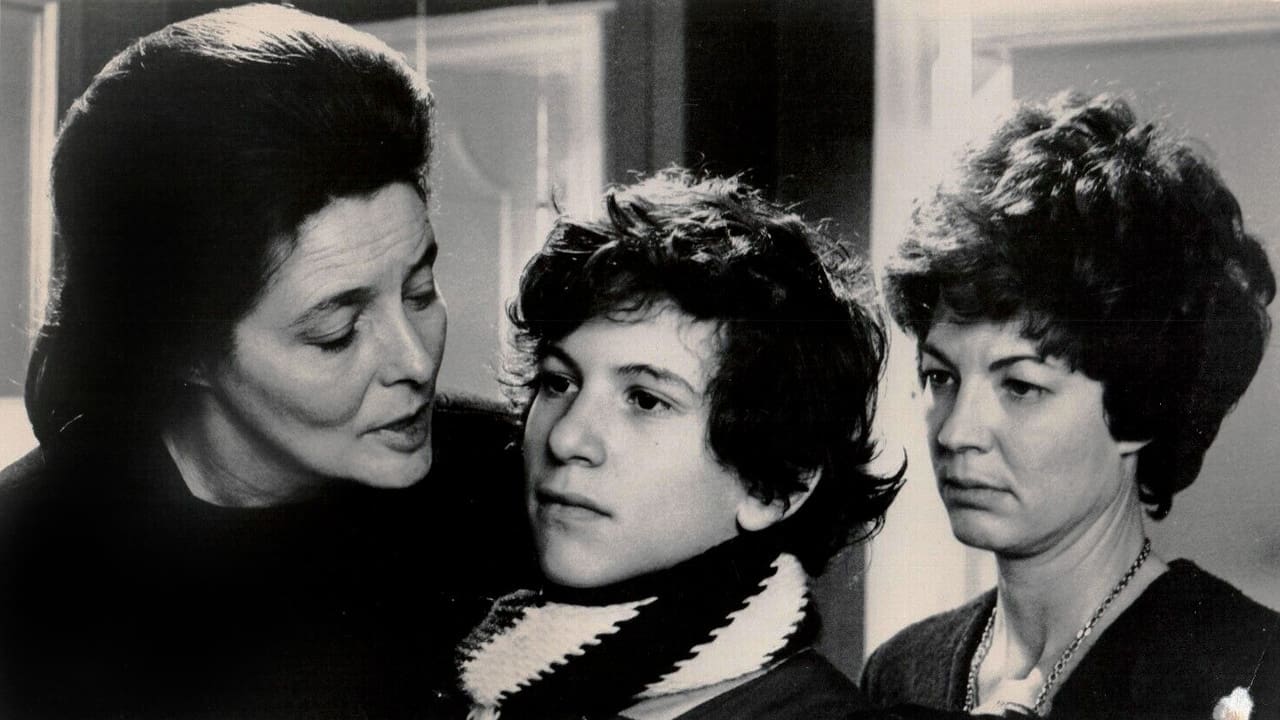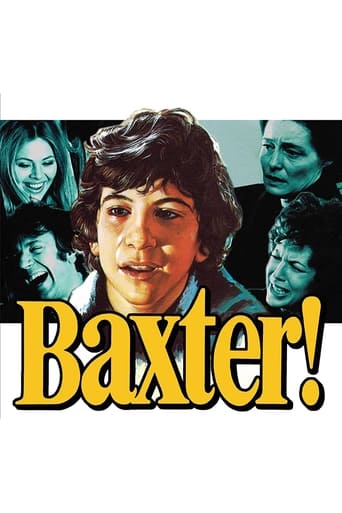Tockinit
not horrible nor great
Pluskylang
Great Film overall
Married Baby
Just intense enough to provide a much-needed diversion, just lightweight enough to make you forget about it soon after it’s over. It’s not exactly “good,” per se, but it does what it sets out to do in terms of putting us on edge, which makes it … successful?
Brenda
The plot isn't so bad, but the pace of storytelling is too slow which makes people bored. Certain moments are so obvious and unnecessary for the main plot. I would've fast-forwarded those moments if it was an online streaming. The ending looks like implying a sequel, not sure if this movie will get one
imbluzclooby
I remember seeing this on TV many years ago. Although it's not the type of subject matter that would appeal to many people it is nonetheless important. Roger Baxter is a teenage boy who has a personal problem causing him embarrassment and grief: His problem is a speech impediment where he has trouble pronouncing his R sound. Roger seems more tormented by this problem than others, but he manages to deal with it in a humorous and mature manner, constantly making references and jokes to put others at ease. But we soon learn his personal speech problem may be an underlying effect of his dysfunctional home life. After his parents divorce, he moves to an upscale flat in London with his cold and inattentive mother. They don't have a very supportive or warm relationship as they bicker and make personal barbs at each other. The movie offers us flashbacks of his previous home life when dad was around. The turmoil between the three of them was enough to put this family over the edge and split apart. Fortunately, Baxter is befriended by a warm and friendly couple, Chris ( a gorgeous model) and her boyfriend, Roger (a reputable chef and author of cookbooks). They take little Baxter on a trip and a heartwarming friendship trio ensues. We get a glimpse of Roger's school life where he seems awkward and out of place among the bigger kids his age. The British teacher is a pompous ass who gets satisfaction out of humiliating Roger. After being ridiculed for his baby-talk he is sent to consult the services of the school Speech therapist (Mrs. Clemm). Their initial meeting is informal as she addresses him in a genuine and cool manner. But they hit it off and another friendship ensues. We don't see them interacting so much in speech therapy, but rather she becomes more of a confidant and personal counselor. Baxter also is befriended by a British girl (Nemo) where he learns about her carefree behavior and permissive parental relations. We are seeing several key factors in this movie: an American boy whose character seems to jar against the European people's character, dysfunctional and abusive parental relations, a boy's inability to cope with his problems and the tragedy of losing a dear friend. This movie does touch upon some very poignant issues and some of the scenes are underlined in progressing the overall pathos of his situation. Baxter is certainly not dealing with anything extraordinary or even insurmountable. These problems are pretty common among families and youth of today. But what makes this movie so special is how it presents them and treats them with compassion. It's rare, if not nonexistent, in movies today. The manner in which this couple befriend and show love for this boy will truly warm your heart. And Britt Eckland was definitely a sight to behold. Patricia Neal is convincing and correctly dominant in her role to protect this young man from his mother and put him under her care and supervision. The climactic ending has a physical confrontation with the boy's mother and his Mrs. Clemm as Mrs. Clemm fights the boy's abusive mother over gaining rights to have him hospitalized due to his acute anxiety that has stricken him. a series of disappointing events including the death of his model friend, Chris, is what has put him over the brink of mental breakdown.This movie is quite dated with its production values. The director uses echoing sound effects during Baxter's moments of fear and psychosis as we have extreme zoom in and out close ups of adults talking at him. This is supposed to magnify how often people are unable to connect with those who are under severe mental breakdowns. There's also a couple of charming scenes where (Chris) strikes fashionable modeling poses while Baxter mimes camera shooting, and another where Baxter and (French Roger) prepare a Lobster feast for his girlfriend. We don't see this type of bittersweet drama anymore and perhaps it may not be marketable in today's pop-culture. I also doubt that this obscure film will resurface in any way except for nostalgic people who have a faint memory of Baxter! and find this on youtube. But Baxter is something that remains in the recesses of my mind.
hawked-off
First of all, the (valid) complaint of some of the other reviewers has been remedied -- this film has now been released on DVD (PAL, Region 2, for the moment). Second, and most important, this film could enter the human development curriculum as a primer on how to treat young adolescents as human beings about to enter and make their contribution to the world, as opposed to mindless sleeping-and-eating robots who need to be sheltered and isolated for as long as possible. Of course, the parents and one of Roger's teachers try the latter approach, but the boy has a mind of his own and finds friends and allies in his neighbourhood and school who accept him as he is -- a bright and resourceful human who is twelve -- and accept him into their social circle. The adult characters are "drawn" a bit one-dimensional, probably so that Roger's friends and allies can contrast clearly with his parents and English teacher. For example, the speed and ease with which Roger is accepted by the romantic couple Chris (Britt Eklund) and Roger T. (Jean-Pierre Cassell) seems a bit contrived, but it doesn't matter. Neither does the fact that a school speech-therapist (Patricia Neal as Dr Clemm) can spend so much one-on-one time with one of her students. What really matters is Scott Jacoby's portrayal of Roger. It is, quite simply, a marvel to watch, and the whole film rides easily on his still-boyish shoulders. (In the same year this film was released, Jacoby won the Emmy for his portrayal of the son of a gay father in "That Certain Summer". One can see his award-caliber acting in this film, as well.) One last point: don't look for a remake of this film any time soon. In my humble opinion, today's society could not deal with a twelve-year-old who makes his own decisions and leads his own life outside his home, in spite of his (crazy, control-freak) mother and absent father, even if he is ready and able to do so. Kids today are "property", and involvement by outsiders, however benevolent, can easily be seen and condemned as a threat to the parent's authority.
yiefthy
"Dear dad, I wish this journey would go on forever" writes young Roger Baxter to his ever-absent father, on the flight from America to England and right away tears up the letter and flushes it down the toilet. That's how this exquisite film about troubled adolescence, indifferent parents and the painful realization of commitment and loss begins. And it's no easy ride. Steering clear of the clichés that usually burden these movies, it offers us a clear and passionate view of the mind of this teenager in the way good British films do, in a simple no-nonsense way. (Kudos to actor-turned-director Lionel Jeffries for his efficient "invisible" direction).A little about the story: Roger Baxter comes to London with his divorced mother. They are rich and he's enrolled in a very exclusive school, which he hates. His mother is a self-absorbed artistic socialite who has little time for her son. His father is still in the States and he's as absent to his son as he is to us viewers (we hardly ever see him). Also Roger has a speaking disability (he cannot pronounce "r") which further separates him from the rest of the "normal" people. The sun shines for our hero through a handful of encounters: to a young couple (a French chef and a Swedish model) who become surrogate older siblings, a young girl who's as close to a romantic interest that Roger comes to but not quite and the Speech therapist who's a much stronger mother figure than his own mother. Through a series of events Roger has his psyche shattered, but the end of this film, a great scene between Scott Jacobi and Jean-Pierre Cassell, is both optimistic and touching.The acting is uniformly very good, but special mention must go to two actors who really carry the film. Scott Jacobi as Roger Baxter gives the performance of his career, while Patricia Neal as the speech therapist conveys both the quiet authority as well as the human warmth needed in the part (Favourite scene: Roger is on the verge of a nervous breakdown and his mother, not understanding what is happening with her son, slaps him. Patricia Neal grabs her wrist and in a very quiet voice says: "I am not a violent person and I will probably hate myself in the morning, but if you as so much as touch this boy I will break every bone in your body").When the movie came out in the early seventies, a British film critic called it "a small masterpiece". Do find out for yourselves that indeed it is so.
chet19
In the early 70s, I never heard of a kid actor named Scott Jacoby. Then one week I saw him in like 3 movies in a row airing in the middle of the night. Baxter! isn't as good as "Bad Ronald," but it held my interest even though I was just a kid, and it's still a great film today. Scott plays this kid Roger with a lisp and he has to get speech therapy. He kinda comes of age while going through this. Sounds kind simple, and it is, but it has some intense moments. Good stuff.

